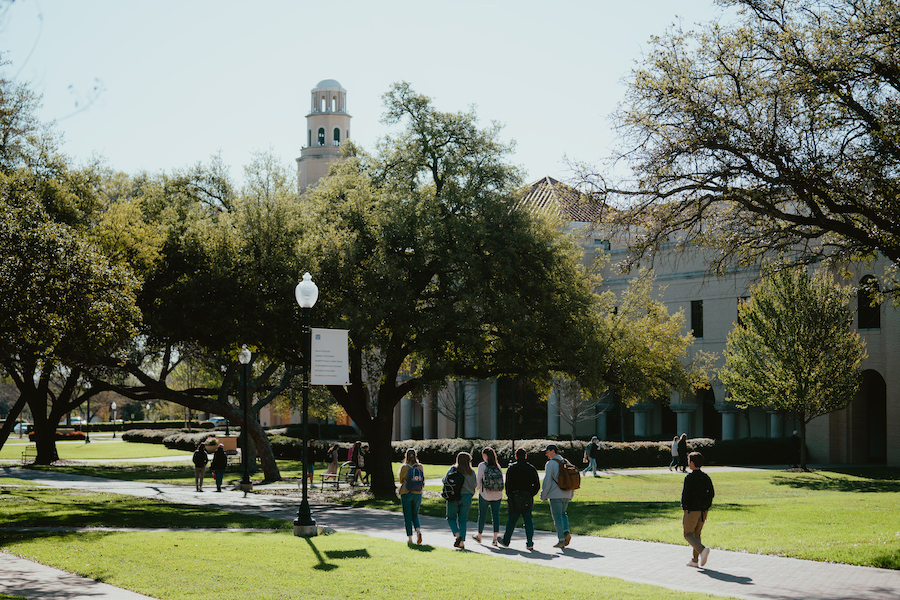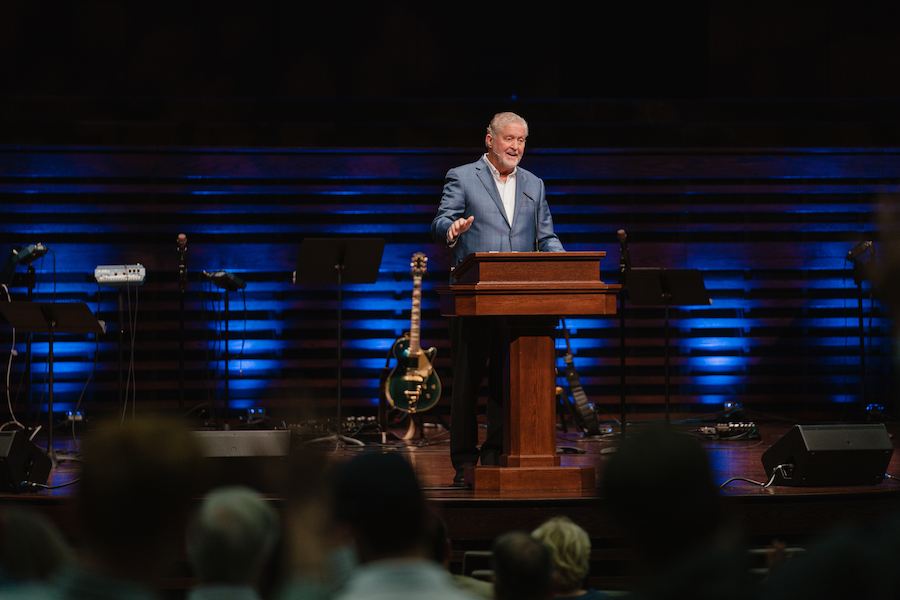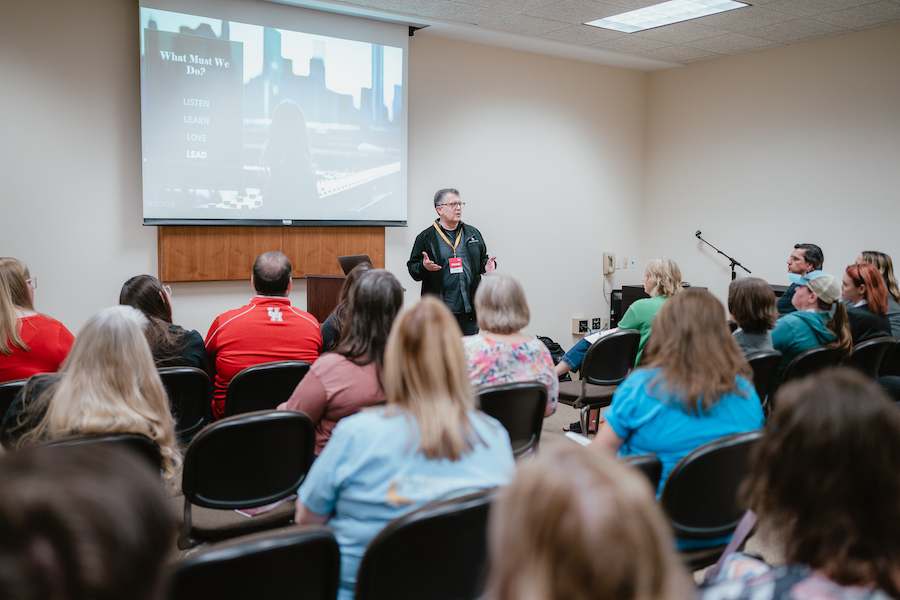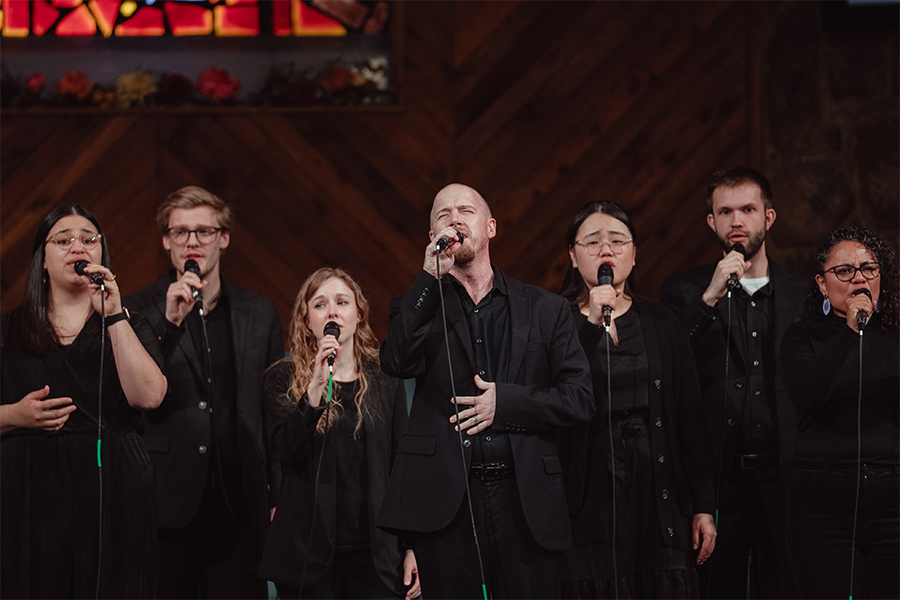George recounts Newman’s contributions to Southwestern Seminary during Founder’s Day address
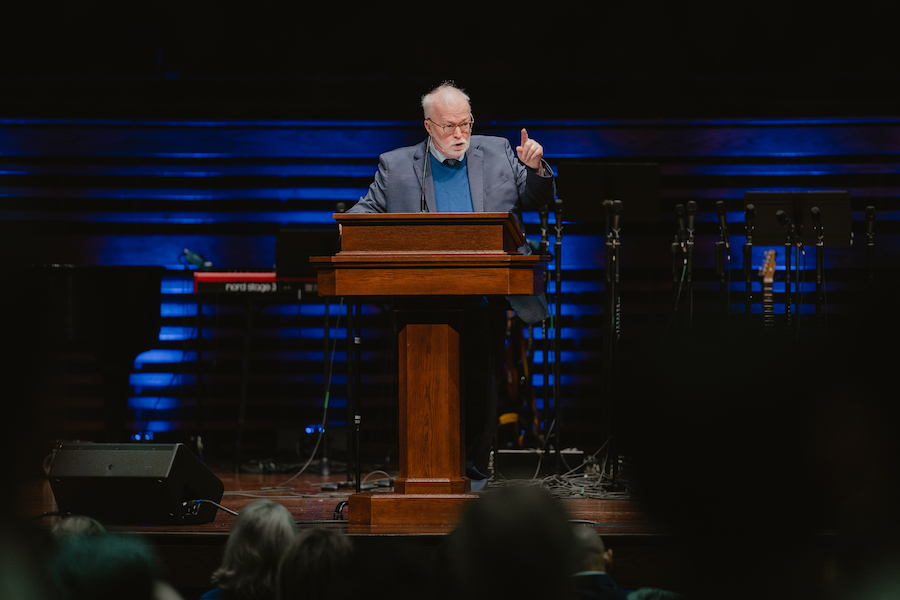
Recalling the life and contributions of Albert Henry Newman, founding dean and an inaugural faculty member of Southwestern Baptist Theological Seminary, distinguished Baptist theologian Timothy George reviewed the life and influence of the “scholar par excellence” during the Fort Worth institution’s Founder’s Day chapel service March 19.
“Founder’s Day is a very special day,” said David S. Dockery, the institution’s tenth president. “It’s a time in which we just pause, take a step back, reflect upon God’s providential care for this institution for 116 years.”
Dockery noted that “through good times and bad, Southwestern Seminary has continued to move forward, preparing ministers for the Gospel to serve the churches, to take the Good News of our Lord Jesus Christ to the nations.”
Founder’s Day commemorates the chartering of Southwestern Seminary on March 14, 1908, and includes a special chapel service and the awarding of the B.H. Carroll and L.R. Scarborough awards, the seminary’s highest honors, to two of the institution’s donors and friends. Founder’s Day is celebrated on the chapel day closest to the seminary’s date of charter.
In his remarks to Southwestern Seminary faculty, staff, students, and friends, George, founding dean of Beeson Divinity School, noted that while Newman was not B.H. Carroll, the seminary’s founder and first president, or L.R. Scarborough, Carroll’s administrator and the institution’s second president, the founding dean “bequeathed to Southwestern the tradition of academic excellence and sound, thorough theological scholarship.”
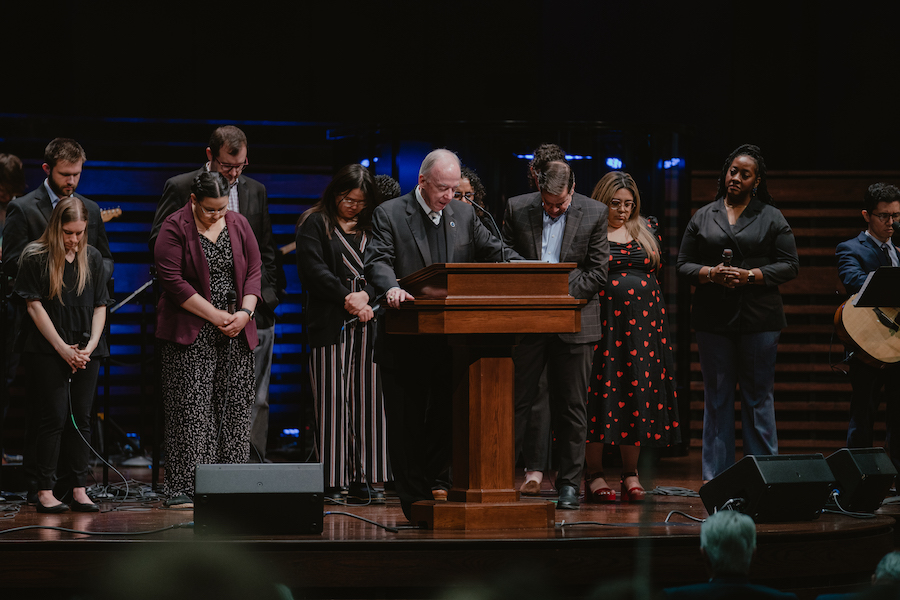
President David S. Dockery leads the Southwestern Baptist Theological Seminary community in prayer before the Founder’s Day chapel at the Fort Worth-based institution. Chartered on March 14, 1908, Founder’s Day is commemorated each year on the chapel day closest to the seminary’s charter.
George added that Newman “helped to save Southwestern” from becoming a “mere Bible institute, a trade school or a degree mill” but also assisted the newly formed seminary to “become a leading school in the development of church history as a theological discipline.”
Tracing Newman’s life beginning in 1852 in Edgefield, South Carolina, George recounted that the young man from the American South was influenced by Epenatus Alexis Steed, a “local Baptist pastor who was also a scholar.” Steed led Newman to faith in Christ, baptized him, and tutored him in Greek and Latin, “instilling in him a life of love for the three l’s: libraries, languages, and literature,” George said.
Newman began his studies at Mercer University in Georgia, where he met his wife, Mary, an Alabama native with whom he would have three sons and one daughter. George explained Mary was instrumental in Southwestern Seminary’s 1910 move from its original location at Baylor University in Waco, Texas, to its current location in Fort Worth. George noted that Mary Newman was “captain of the ship” of the seminary’s relocation and was made superintendent of Fort Worth Hall, the seminary’s first building that housed classrooms, the library, chapel, and dorms.
Observing that Newman did not begin as a church historian but was influenced by a “visit” to Southern Baptist Theological Seminary, then located in Greenville, South Carolina, which “changed his direction,” George said. While at Southern, Newman studied for one year under Crawford Toy who was introducing new ideas to his students that included “rationalistic methods of studying the Bible” which were “casting aspersion on biblical authority and inerrancy,” he explained. Though Newman “learned a lot” from Toy, George said, he “could not follow the radical conclusions to which Toy had come” and left Southern Seminary after a few years. Toy’s views ultimately led to his departure from Southern’s faculty.
However, George explained, Newman had also studied Patristic Greek at Southern Seminary with John A. Broadus. A letter from Broadus to Newman marked “a turning point” in the young seminarian’s academic life and work, he said.
Quoting from the letter, George read that Broadus encouraged Newman to continue in his work in church history as “we have no American Baptists but you and [W.H.] Whitsitt” who were “really making researches into that great subject” and the larger denomination was becoming “interested” in the subject.
“With that letter, Newman changed subjects, areas of study,” George said. “The world lost a great Semitic scholar and gained a first-rate church historian.”
Newman then spent two decades teaching at McMaster Divinity School in Hamilton, Ontario.
“Those Canadian years were the most prolific of his life, as he began to pour out a series of scholarly works that would establish him as the leading international scholar of Baptist studies,” George observed.
Calling Newman an “amazingly prolific writer,” George highlighted Newman’s works, including his 1887 translation and editing of one of the volumes of the Nicene and post-Nicene fathers of the Christian church series, his 1894 history of Baptist churches in the United States as part of a 13-volume series highlighting denominational histories, and his 1897 A History of Anti-Pedobaptism. George added that Newman also authored a two-volume work on church history in 1899 and 1903, and in 1901 wrote A Century of Baptist Achievement, which provided a “magnificent record” of the previous 100 years.
George noted Newman’s church history books were “widely used” as church history textbooks, including in classes at Southwestern Seminary, while the history of 19th-century Baptist achievement included essays from Carroll, B.F. Riley, who was pastoring First Baptist Church of Houston, Texas, J.M. Frost, founder of what is now known as Lifeway Christian Resources, and E.Y. Mullins, president of Southern Seminary, among others. The “volume played an important role in promoting the spirit of Baptists unity and cooperation, which led to the founding of the Baptist World Alliance in 1905,” George added.
Newman joined the faculty of Baylor University in 1901 and became the founding dean of Southwestern Seminary in 1908. Noting the importance of Carroll’s “ability to choose the right person for the right job at the right time,” George highlighted the roles of Scarborough and George W. Truett, chairman of the seminary’s board of trustees, at Southwestern’s founding, and asked, “who else but A.H. Newman could have brought together academic integrity and scholarly credibility for the founding of a fledgling Seminary in the heart of Texas?”
“His reputation and scholarly work as a church historian were known and respected far and wide,” George said.
However, he added, Newman had “troubled waters” during his time at Baylor and Southwestern. Newman was involved in the controversy resulting from Whitsitt’s rejection of the “idea of a lineal succession of true Baptist churches going back through the ages to apostolic times, or to Jesus Himself” and that baptism by immersion as an ordinance had not been introduced to Baptists in England before 1641. George said “the Baptist house was divided” over the issue and Southwestern became involved as Carroll was chairman of the board of trustees at Southern Seminary, where Whitsitt was president. George noted Carroll was “not happy” about Whitsitt’s views.
However, after Southwestern Seminary relocated to Fort Worth from Waco in 1910, Newman came into conflict with Carroll after Newman, as the dean of the institution, sought to change the curriculum. Carroll’s health began to fail, and he lapsed into a coma, George explained. Newman, J.J. Reeve, a faculty member, and other faculty “got together and redid the curriculum, to attenuate and almost eliminate the introduction to the English Bible,” Carroll’s favorite course. When Carroll woke from his coma and learned of Newman’s actions, “he summoned Newman and J.J. Reeve to his home here on Seminary Hill, and peremptorily fired them,” George said.
George added that Newman taught for another 20 years, including at Baylor, Mercer, and McMaster, before dying in Austin, Texas, in 1933 after he was hit by a car while helping a child cross a street.
George concluded that Newman’s greatest legacy to Southwestern is three-fold.
“His greatest legacy was a life of serious historical scholarship as a service done to God, worth doing with excellence,” George said. “He bequeathed that legacy to all who come in his train. An attention, or close attention, to sources rooted in the Baptist tradition, which he believed sincerely, most closely reflected the apostolic Christianity of the New Testament.”
However, George observed, Newman’s “greatest fault” was that he was “too optimistic” as he never “fully absorbed the impact of World War I.”
“He was a post-millennialist,” George explained. “He believed that with enough time and enough evangelization all over the world, the whole world would become Christian, all religions would become Christian, and all Protestants would become Baptists. He never appreciated the apocalyptic age in which he lived.”
But, as George concluded, Newman’s student and fellow founding member at Southwestern, W.T. Conner, said at Newman’s funeral that “as a scholar” he did “not consider that I’ve ever met any man who was his superior” but that the church historian was also “a devout Christian.”
George is a two-time graduate of Harvard University, earning both a Master of Divinity and Doctor of Theology, from the Cambridge, Massachusetts, institution. He also holds an undergraduate degree from the University of Tennessee at Chattanooga. A prolific author and distinguished theologian, George is the founding dean of Beeson Divinity School in Samford, Alabama, and currently serves as distinguished professor of divinity.
